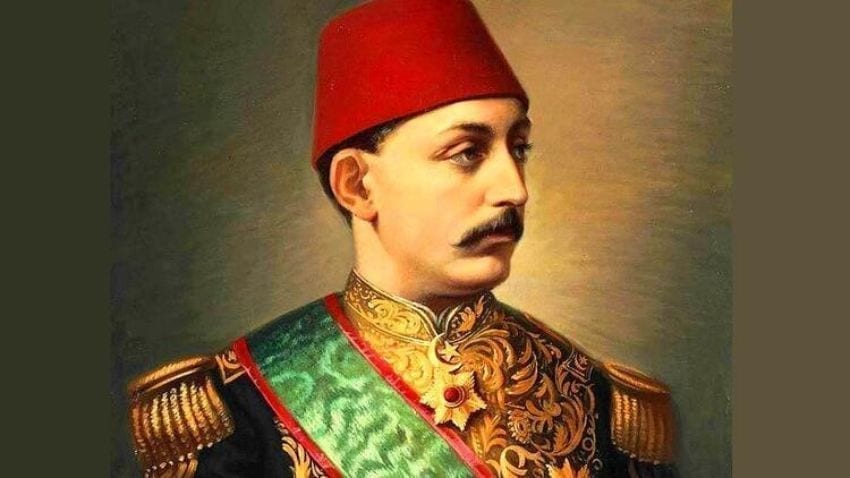Table of Contents
Sultan Murad V is considered one of the most controversial sultans in the Ottoman Empire, as he is the only sultana who joined the Masonic Society.
Sultan Murad V took power for a short period, and was isolated due to his suffering from a nervous breakdown after the killing of his uncle, Sultan Abdul Aziz.

The lineage and family of Sultan Murad V
Sultan Murad V belongs to the Ottoman family, as his full name until Ertugrul Gazi is:
He is Sultan Murad the Fifth, son of Abdul Majeed I son of Mahmoud II son of Abd al-Hamid I son of Ahmed III son of Muhammad IV son of Ibrahim I son of Ahmed I son of Muhammad III son of Murad III son of Salim II son of Suleiman the Magnificent son of Selim I bin Bayazid II son of Muhammad Al-Fatih son of Murad II son of Muhammad I son of Bayazid I son of Murad I son of Orhan Gazi son of Osman son of Erturgul Gazi
The early life of Sultan Murad V
Sultan Murad V grew up in Chergan Palace, and learned the Holy Quran, Ottoman language and hadith, in addition to French and the piano.
The Sultan also studied French literature, the arts of Turkish rhetoric and rhetoric, and had an inclination towards poetry and music.
The young prince took great interest in architecture and the arts, as he spent huge sums building and modifying his palace in Korbgha several times.
According to some sources, Prince Murad had been spending a long time in thought and was feeling gloomy for much of his day.
The prince participated with his uncle, Sultan Abdul Aziz, on a trip to Egypt and Europe, and Shahzada Murad V aroused the admiration of Napoleon III and Queen Victoria because of his ideas that tended to Westernize.
Prince Murad contacted the Society of the Neo-Ottomans, and privately joined the Society of Freemasons.
Murad V was the first member of the Ottoman family to join Freemasonry, and he suggested establishing a separate Masonic branch in the country called “Eastern Anwar”. He also suggested holding Masonic rituals in the lodge in Turkish, which was not implemented at the time.
Sultan Abdul Aziz tightened control over Prince Murad and prevented him from going out on foot and allowed him to walk only in a closed carriage that people could not see, with prior permission every time he wanted to go out.
During his tenure, Prince Murad asked a French lawyer to prepare a constitution for the Ottoman state for him to implement upon assuming power.
Sultan Abdul Aziz tried to dismiss Prince Murad from the mandate of the Covenant, but he was unable to do so after a coup against the Sultan ended with his removal.
The reign of Sultan Murad V
Sultan Murad V ascended to power after cooperating with supporters of the constitution and dismissing his uncle, Sultan Abdul Aziz.
Sultan Murad V could not appear naturally, urging that he was subjected to severe shock after the death of his uncle Sultan Abdul Aziz, only days after he assumed power.
The Sultan was terrified by the death of his uncle and feared that the public would think that he had ordered his killing, as the Sultan showed symptoms of a nervous breakdown to the point that he was unable to distinguish between his ministers.
The ministers were forced to postpone the ceremony of wearing the sword and accrediting foreign ambassadors. The Sultan’s illness became more severe and an Austrian psychiatrist was called to examine the sultan’s psychological state.
The Austrian doctor emphasized the difficulty of healing Sultan Murad V from a psychological breakdown, as the Sultan accused himself of killing his uncle, Sultan Abdul Aziz.
The ministers turned to Prince Abdul Hamid II, who was in excellent psychological and physical health, asking him to assume power and isolate his brother, but Abdul Hamid preferred to wait so that Sultan Murad might recover.
The notables and ministers met with the Sheikh of Islam, who issued a fatwa that Sultan Murad V was incompetent to rule, and his reign ended after only two months for Sultan Abdul Hamid II to rule the Ottoman Empire.

The life of the Sultan after his removal
After nearly nine months of imprisonment, Murad V had regained his mental strength. The first two years of his imprisonment in neighbors witnessed three attempts by his supporters to liberate him and restore him to the throne, but all three led only to the tightening of Sultan Abdul Hamid II’s isolation measures.
Sultan Murad V dies
Sultan Murad, who was suffering from diabetes, died in Cigran Palace on August 29, 1904, his funeral was held without an announcement or official ceremony.
Also read: Endrun Ottoman School
His body was washed and shrouded in Topkapi Palace, then transferred to Hedayat Mosque in Bahjikapi. After the funeral procession was held, he was buried next to his mother, Shafakza, in the New Mosque in Istanbul.




